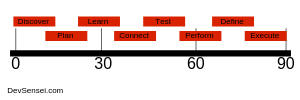How to become a Software Developer – Your 90 Day Plan
Why you need a plan.
All good things start with a plan. That’s especially true when you have a goal, such as becoming a Software Developer. Any dream needs to be converted into a goal, meaning that it is something that you can clearly define and achieve. Anything that I’ve tried with any varying complexity has not turned out too well without some sort of plan. This includes things professional and in my personal life.
Without a plan or direction we end up ‘floating’ along to wherever life takes us. Have you ever swam in the ocean and found yourself unexpectedly away from where you started? Life throws things at us and acts a lot like the currents of the ocean. If you don’t keep an eye on where you want to be then you’ll find yourself constantly fighting to get back to where you want to be.
The duration of the plan depends on the nature of the goal. Becoming a Software Developer may not be a clearly defined or easy path to follow so that’s where I come in to be your guide and help you to not waste time.
The idea is that you’ll be ready to go into your job search with full force at the end of 90 days. Some may get there earlier, some a little later. If you put some thought into your plan and execute it with intensity and enthusiasm then you’ll be way further head in a few months from where you are now.
Your goal may not even be to get a job in 90 days but if it is then I want to give you the best chance to get there. This is to give you momentum and get to a place where you can say with confidence that you’re a Software Developer or if you need to adjust at the end of the period.
Create Your Plan
I’m going to give you a framework to follow. You’ll go from deciding on your focus, to learning, branding, and ultimately to a job. The following is an overview of what we’ll cover.

- Software Development niche or specialization.
- Setting monthly, weekly, and daily goals.
- What to learn and where to learn it?
- How to accelerate your learning.
- Testing your skills
- Gaining experience
- Finding a mentor
- Building your brand as a Software Developer
- Create a position profile. Define your dream position.
- Create a career profile. This is defining the ideal company that you’d like to work for.
- Networking – Finding others like yourself where you can get help and even help others.
- Interviewing and job offer.
You may be thinking that there’s no way you’ll be able to go form zero to job in 90 days. This does depend on your current skill level, how much time you can put in, and your aptitude for writing code. Whether you have no experience, 1 year, 3 years or 5 it’s good to get a plan and timeline in place to help you along. The important thing is that in 90 days you’ll have a clear idea of your future and confidence to move into it.

 Hi, I'm Josh Cook. I'm here to help you transition into a career in Software Development.
Hi, I'm Josh Cook. I'm here to help you transition into a career in Software Development.